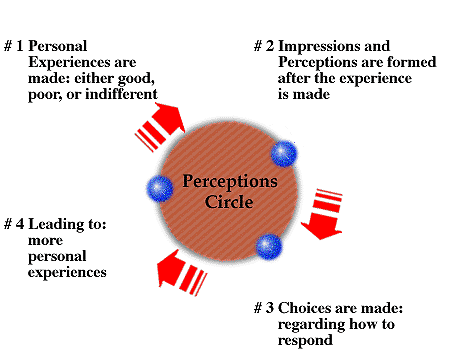Perceptions
What are Perceptions?
Things you Comprehend
Awareness or Understanding
Impressions or Insights
How are Perceptions formed?
Experiences in life (everyday living)
Experiences with people (both good, and poor, ones)
Knowledge (information: accurate, or inaccurate)
Culture and Society (from personal or public experiences )
Attitudes (friendly, or unfriendly) Relating to people or things
Interests (things people like to do, or dislike doing)
From the perceptions of others (approval or disapproval)
Consider the image below that describes how perceptions are formed.
Follow each of the four steps around the circle several times to see
also how perceptions can be strengthened and perpetuated.

The Perceptions Circle
Step #1 begins with a personal experience being made.
The experience may be an excellent one, or it may be difficult. It is possible
to make an experience where you find the result wasn’t particularly good or bad.
You might say that it was perhaps an indifferent one.
In Step #2 after the experience (and sometimes even during the
time it’s being made), impressions and perceptions of the event begin to be formed.
Depending on what the experience was, and how it was responded to, perceptions will
be further developed.
In Steps #3 and 4 choices are made regarding the way to respond
to these perceptions, both now, and for the future. If the experience, and the
perception of it, was good, then we might choose to respond in a positive way,
which can lead to more and better experiences and stronger good impressions. These
can in turn lead us to choose to repeat the experience and thus perpetuate the thing
we enjoyed.
If, on the other hand, the experience made was different,
and the impressions, and perceptions, of it lead toward the negative side… then
the choice as to whether or not to go through the experience again is more difficult to
consider, or repeat.
Think about this in relation to experiences that are made
with people you know; and even with your own perceptions.
If your perceptions of certain people are good, then
there is a tendency to want to be with them, and make more good experiences.
If, for some reason the experiences begin to change, and things aren’t so nice…
perceptions have a way of changing, and the choices made regarding them can affect
personal encounters being considered for the future.
You’ll discover later in this study some ways to break into the negative part
of this perception cycle and create some positive improvements in personal
relationships, but first…
Let’s look at some examples of perceptions in action:
What you are about to review is only a small part of a larger picture
relating to people whose lives, experiences, and characters were recorded
in the Bible.
It is interesting to note the differences in perceptions:
Moses (Leader of ancient Israel)
How many people today perceive Moses:
Strong, faithful leader, greatly honored by God.
How Moses perceived himself:
Not believable, eloquent, or a good speaker
Exodus 4:1, 10
How God perceived Moses:
Able to do a great work with God’s help
Exodus 4:11-15
Jeremiah (Prophet of God)
How people today often perceive Jeremiah:
As a Prophet of God, faithful and true
How Jeremiah perceived himself:
As a child-unable to speak
Jeremiah 1:6
How God perceived Jeremiah:
Able to do great things with God’s direction
Jeremiah 1:4, 5, 7-9
Elijah (Prophet of God):
How people today often perceive Elijah:
As a faithful Prophet; greatly honored by God
How others in his time perceived him:
As the trouble-maker of Israel
1 Kings 18:17
How Elijah perceived himself:
As the only faithful soul left; worn out and ready to die
1 Kings 19:4, 14
How Elijah perceived others:
As uncommitted and unfaithful to God
1 Kings 18:21, 22
How God perceived Elijah:
In need of some rest, food, strength and a new commission
1 Kings 19:7, 15
Mary Magdalene: (An early Christian convert)
How people today might have perceived Mary:
As an adulteress woman, who had intimate relations with leaders
of the church; perhaps a prostitute; certainly not someone considered
to have a good character; not someone they would want to be seen
associating with.
How some others perceived her in her time:
As an immoral woman, needing to be condemned
John 8:3, 4
How she perceived herself:
As guilty; but saying nothing in her own defense.
How Jesus perceived her:
As someone not to be condemned; but as one to have compassion on.
See John 8:10, 11
As has been demonstrated, people perceive things in different ways. In order
to understand something, people select what they want to hear. They usually
don’t attend to everything that is spoken. They filter out information and
consider only what seems important to them.
What you think is important may not
be perceived as important by someone else.
Consider a typical experience from childhood in America (probably some years ago):
Scene One: Mom calls – but the child doesn’t seem to hear.
There’s no response… The child isn’t deaf, or beyond the sound of Mom’s
voice, but chooses instead not to respond for one reason, or another.
Scene Two: Music from an ice cream truck offering cool treats is heard in the
neighborhood. The same child who was deaf to Mom’s call a moment ago
would probably hear, and respond quickly to the sound of the truck, even
if it was several blocks away.
What made the difference? Was it the sound of the truck’s music, or the hope
of receiving a nice treat that was perceived as important?
And what about Mom’s voice? Wasn’t that an important one to respond to also?
Yes, but, one never knows what Mom may want (an end of playtime, come in to take a bath,
for homework to be done, etc.). The ice cream truck on the other hand has something that could
be counted on for sweet enjoyment.
Perceptions of things are truly important.
In this study there are four images designed to test your perceptive abilities
(You may have seen them before).
What do they appear like to you?
Can you identify what they reveal?


![]()

How Negative Perceptions Can Be Changed
It’s important to understand that negative perceptions which have been formed
in the past are not necessarily destined to remain that way. With effort and
cooperation the usual results of the cycle can be changed, and in some cases
the cycle can be broken. New, and better, perceptions can arise.
The outcome rests with the choices that are made after the impression and
perception forming process has begun. Because someone has made a difficult
experience, or has a negative perception of someone (or something) doesn’t mean
that every encounter has to be negative.
You can choose to act differently than might be expected.
You can show love, and kindness, when hatred or rejection might be expected.
You can try to look deeper into the experience, and see if it was perceived correctly
Or what might have been done to change the outcome.
There are as many possibilities as there are experiences to be made.
But, the decision regarding how you respond is yours.
It may sometimes seem, on the surface, easier just to avoid having to repeat a
difficult encounter with someone, or go through a trying experience again; but
with a good understanding, and attitude, a repeated experience can end up to be
one of life’s greatest blessings.
Everything depends on the decision, and response.
For the Christian, God’s ways are always best.
And, it’s always safe to ask: What would Jesus do if He were in my place at this moment?
How would He respond?
What decision would He make in this situation?
It may be difficult, but it’s usually not hopeless…
“…With God all things are possible.” Matthew 19: 26
How some ways things are perceived:
How people perceive you… and… How you perceive others…
Good or bad / valuable or worthless
Intelligent or lacking intelligence
Wise or foolish / spiritual or worldly
As a friend, or an enemy
How you perceive yourself
Valuable, or worthless, and unprofitable
With great potential, or empty, with with nothing to share
Strong, or weak, and fearful
Able to be saved, or a lost soul
Intelligent, or lacking knowledge, and understanding
How you think others perceive you
Usually not the same as you believe
How you perceive God
Loving and kind, or angry, and vengeful
Understanding, and patient
Concerned, or uninterested, and preoccupied
How God really perceives people
Differently than they expect.
…For the Lord seeth not as man seeth;
for man looketh on the outward appearance,
but the Lord looketh on the heart.
1 Samuel 16: 7
How people think God perceives them
Usually in a different way than He really does if the impression
people have of themselves, or their impression of Him,
isn’t what it needs to be.
Do you think is it important to study about perceptions ?
Why?
Sometimes the ways in which we perceive things causes problems.
What exactly is the problem ? Some say people are the problem.
In reality, people are not the problem; people have problems
The ways you perceive yourself, others, God,
and the world around you, affect your daily life
in a variety of ways
How you live: a productive, or unproductive life
How you choose to work: actively, or inactively
How you interact with others around you: socially, or unsocially;
cooperatively, or uncooperatively
How you are maturing: with balance, or imbalanced
How you generally progress in life, moving ahead, or falling behind
Standing still usually means going backwards…
Let’s move forward!
We hope you have enjoyed and gained something from this study on
perceptions and that it has helped your understanding in this area.
Could you take a few minutes to contact us and share your thoughts regarding how the CARE studies have
affected the way you ?
We can be reached through our Contact page.
Your feedback will assist in developing our website further to help us to
meet the needs of those we serve. Thank you for your feedback.
This article was written, and the image created, by Chris Teske for VisdaPoint.com
The next article in this series is entitled: Three Things Everyone Wants. Use the Next > link to connect with it.









